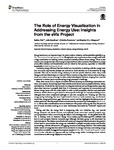The Role of Energy Visualization in Addressing Energy Use: Insights from the eViz Project
| dc.contributor.author | Pahl, Sabine | |
| dc.contributor.author | Goodhew, Julie | |
| dc.contributor.author | Boomsma, C | |
| dc.contributor.author | Sheppard, SRJ | |
| dc.date.accessioned | 2018-08-13T10:07:44Z | |
| dc.date.available | 2018-08-13T10:07:44Z | |
| dc.date.issued | 2016-02-09 | |
| dc.identifier.issn | 1664-1078 | |
| dc.identifier.issn | 1664-1078 | |
| dc.identifier.other | ARTN 92 | |
| dc.identifier.uri | http://hdl.handle.net/10026.1/12019 | |
| dc.description.abstract |
Energy has become an important topic for policy makers, industry, and householders globally (e.g., IEA-International Energy Agency, 2015). Changing the way we generate and use energy could make a huge contribution to reducing carbon emissions and help address climate change. There is also concern over energy security where energy is imported from other countries. Fluctuations in energy prices affect industry and householders and are linked to fuel poverty, especially in vulnerable households (Liddell and Morris, 2010). Increasing energy efficiency has been hailed as a key solution to dealing with the energy issue (see www.eceee.org) but has perhaps not received as much attention as is warranted by its huge potential. This may be because energy efficiency is not one specific solution; rather many small changes and interrelated steps are required. This is contrary to big-ticket visions such as finding a novel non-carbon source of energy or other solely technological solutions, ranging from renewed investment in nuclear power to automating energy processes in buildings. Thus, there seems to be a degree of conflict between focusing on technology, automation etc. and a more systems-focused approach that includes social factors such as people’s attitudes, values, and behaviors. We think the way forward is to integrate technical and social approaches, especially where they intervene in people’s daily lives. It is necessary and important to communicate and discuss energy issues with the wider public in order to find acceptable, effective and sustainable solutions, whether these are grid-related or about specific buildings. For example, building science colleagues have often complained (jokingly or not) how occupants are “messing up” after key energy-saving technology has been implemented in home or work contexts (e.g., see literature around the energy performance gap). Moreover, recent work has highlighted the phenomenon of techno-optimism whereby people tend to overestimate the success of new technologies (Clark et al., 2015). These wider considerations serve to situate our eViz project (eViz.org.uk) from the point of view of social scientists working on an issue traditionally dominated by “technical” experts and views. | |
| dc.format.extent | 92- | |
| dc.format.medium | Electronic-eCollection | |
| dc.language | eng | |
| dc.language.iso | eng | |
| dc.publisher | Frontiers Media SA | |
| dc.subject | thermal imaging | |
| dc.subject | visualization | |
| dc.subject | behavior change | |
| dc.subject | energy efficiency | |
| dc.subject | retrofit | |
| dc.title | The Role of Energy Visualization in Addressing Energy Use: Insights from the eViz Project | |
| dc.type | journal-article | |
| dc.type | Journal Article | |
| plymouth.author-url | https://www.webofscience.com/api/gateway?GWVersion=2&SrcApp=PARTNER_APP&SrcAuth=LinksAMR&KeyUT=WOS:000369861200001&DestLinkType=FullRecord&DestApp=ALL_WOS&UsrCustomerID=11bb513d99f797142bcfeffcc58ea008 | |
| plymouth.volume | 7 | |
| plymouth.publication-status | Published online | |
| plymouth.journal | Frontiers in Psychology | |
| dc.identifier.doi | 10.3389/fpsyg.2016.00092 | |
| plymouth.organisational-group | /Plymouth | |
| plymouth.organisational-group | /Plymouth/Faculty of Arts, Humanities and Business | |
| plymouth.organisational-group | /Plymouth/Faculty of Arts, Humanities and Business/School of Art, Design and Architecture | |
| plymouth.organisational-group | /Plymouth/Faculty of Health | |
| plymouth.organisational-group | /Plymouth/REF 2021 Researchers by UoA | |
| plymouth.organisational-group | /Plymouth/REF 2021 Researchers by UoA/UoA04 Psychology, Psychiatry and Neuroscience | |
| plymouth.organisational-group | /Plymouth/REF 2021 Researchers by UoA/UoA04 Psychology, Psychiatry and Neuroscience/UoA04 Psychology, Psychiatry and Neuroscience MANUAL | |
| plymouth.organisational-group | /Plymouth/Research Groups | |
| plymouth.organisational-group | /Plymouth/Research Groups/Centre for Brain, Cognition and Behaviour (CBCB) | |
| plymouth.organisational-group | /Plymouth/Research Groups/Centre for Brain, Cognition and Behaviour (CBCB)/Behaviour | |
| plymouth.organisational-group | /Plymouth/Research Groups/Institute of Health and Community | |
| plymouth.organisational-group | /Plymouth/Users by role | |
| plymouth.organisational-group | /Plymouth/Users by role/Academics | |
| dc.publisher.place | Switzerland | |
| dcterms.dateAccepted | 2016-01-01 | |
| dc.rights.embargodate | 2023-9-26 | |
| dc.identifier.eissn | 1664-1078 | |
| dc.rights.embargoperiod | Not known | |
| rioxxterms.funder | Engineering and Physical Sciences Research Council | |
| rioxxterms.identifier.project | EPSRC Transforming Energy Demand in Buildings through Digital Innovation (BuildTEDDI) Scheme | |
| rioxxterms.versionofrecord | 10.3389/fpsyg.2016.00092 | |
| rioxxterms.licenseref.uri | http://www.rioxx.net/licenses/all-rights-reserved | |
| rioxxterms.licenseref.startdate | 2016 | |
| rioxxterms.type | Journal Article/Review | |
| plymouth.funder | EPSRC Transforming Energy Demand in Buildings through Digital Innovation (BuildTEDDI) Scheme::Engineering and Physical Sciences Research Council |


